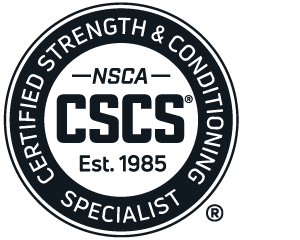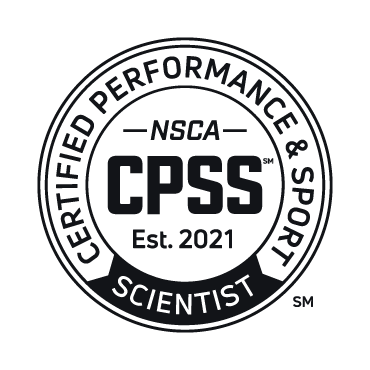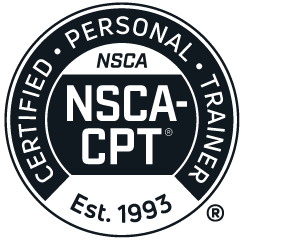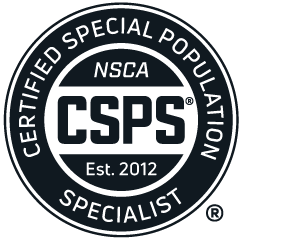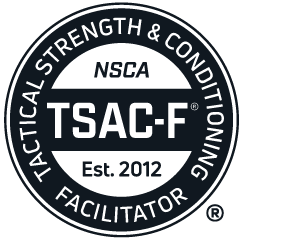Choosing the Right Certification
If you plan to be NSCA certified, your first step is to decide which NSCA certification is right for your desired career path. Choosing the right NSCA certification will help direct your career toward a specific category of the industry, while additional certifications can help prepare you for career advancement.

Planning to get certified? Unsure which one best fits your career goals? We can help.
In your journey toward your ideal career, it is critical to consider what area of the industry you plan to focus on. Each certification serves various groups of people with specific health, fitness, or performance goals. The steps below will help you select the right certification that fits your career goals:
STEP 1: Who Do You Want to Work With?
NSCA certifications encompass three population types. Each category includes people looking for specific results based on their existing health as well as athletic or fitness goals.
Competitive, Tactical, and Occupational Athletes Seeking Improved Performance
Improve athletic performance for the competitive, tactical, or occupational athletes including those at the youth, recreational, collegiate, or professional levels. Applicable certifications: CSCS, CPSS,TSAC-FGeneral Population Seeking Improved Health & Fitness
Improve strength and conditioning to maintain health and fitness for the “athletes of life” — from youth to seniors. Applicable certifications: NSCA-CPT, TSAC-FIndividuals With Health or Ability Considerations Seeking Improved Fitness, Health, or Performance
Improve strength and conditioning for those with temporary or chronic health conditions, to reach individual health, fitness, or competitive performance goals. Applicable Certifications: CSPS, TSAC-FSTEP 2: What Type of Training Do You Want to Provide?
When considering a certification, look at the typical training that a certified individual provides to their clients or athletes. The type of training will also indicate a more specific group of people you work with, as well as typical job settings. Keep in mind each certification covers organizational and administrative duties along with legal issues specific to each job setting.
|
|
|
Training Provided Coach athletes specifically for their sport by providing a variety of training types that improve:
|
|
Typical Job Setting
|
|
|
|
Training Provided Perform in-the-field research and develop data-driven recommendations for training athletes to improve performance through various training types and methods. |
|
Typical Job Setting
|
|
|
|
Training Provided Instruct clients or small groups of individuals using a variety of training types to maintain or improve their personal physical abilities such as:
|
|
Typical Job Setting
|
|
|
|
Training Provided Coach or instruct clients using a highly customized approach to accommodate physical limitations, injuries, and health conditions. Provide training to safely maintain or improve their individual physical abilities such as:
|
|
Typical Job Setting
|
|
|
|
Training Provided Train military, law enforcement, and fire and rescue personnel to improve on-the-job performance, promote wellness, and decrease injury risk. Maintain and improve physical abilities such as:
|
|
Typical Job Setting
|
STEP 3: What Education and Experience Do You Have or Plan to Achieve?
Each certification requires a certain level of education before you are eligible to sit for the exam. Some certifications also require industry experience as well. Many NSCA-certified individuals hold multiple certifications that were earned as they gained experience in their careers.
|
|
|
Hold a bachelor's degree or higher, and have a current CPR/AED certification. Currently enrolled college seniors at an accredited institution may sit for the CSCS exam, but must show proof of degree before credentials are given. |
|
|
|
Hold a bachelor's degree or higher in Sport Science or similar degree with related coursework, plus verified full-time professional experience, and have a current CPR/AED certification. |
|
|
|
Hold a High School Diploma or an equivalent, have a current CPR/AED certification, and be at least 18 years old. |
|
|
|
Hold a bachelor's degree in Exercise Science or a related field, or hold an NCCA-accredited personal trainer certification or similar. You must also have a current CPR/AED certification. |
|
|
|
Hold a High School Diploma or an equivalent, have a current CPR/AED certification, and be at least 18 years old. |
STEP 4: Consider What You Need to Know to Pass the Exam
Each certification exam tests the knowledge, skills, and abilities (KSAs) required to successfully perform your job as a certified individual. NSCA certifications are NCCA-accredited, which means the exams are rigorous and will require study. Look over the following general topics covered on each exam.
|
|
|
General Exam Content |
|
Exercise Science & Technique Program Design & Planning Needs Analysis Testing, Monitoring, and Evaluation Facility Organization & Administration Sport Psychology Nutrition |
| How to Prepare |
|
|
|
General Exam Content |
|
Exercise Science Program Design Needs Analysis Testing, Monitoring, and Evaluation Sport Psychology Research Methods & Data Science Training Theory & Process |
| Learn about the CPSS |
|
|
|
General Exam Content |
|
Exercise Technique Program Planning Client Consultation & Assessment Safety, Emergency, and Legal Considerations |
| How to Prepare |
|
|
|
General Exam Content |
|
Exercise Technique Program Planning Client Consultation & Assessment Safety, Emergency, and Legal Considerations Basic Pathophysiology Science of Health Status or Condition, Disorder, or Disease |
| How to Prepare |
|
|
|
General Exam Content |
|
Exercise Science & Technique Program Design Wellness Intervention Testing, Monitoring, and Evaluation Facility Organization & Administration Nutrition |
| How to Prepare |
Strength and Conditioning Career Guide
Now that you have a better idea of the differences between each NSCA certification, take a deeper look at the careers available in strength and conditioning. The NSCA's Career Guide delivers insight from industry leaders to help you get a head start on your chosen career path.
- Privacy Policy
- Your Privacy Choices
- Terms of Use
- Retraction and Correction Policy
- © 2025 National Strength and Conditioning Association
